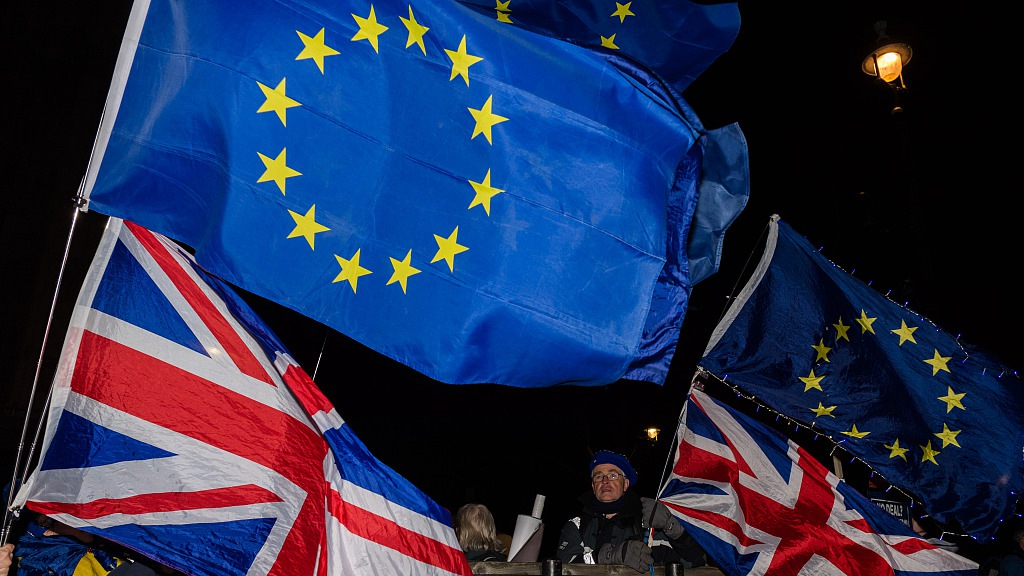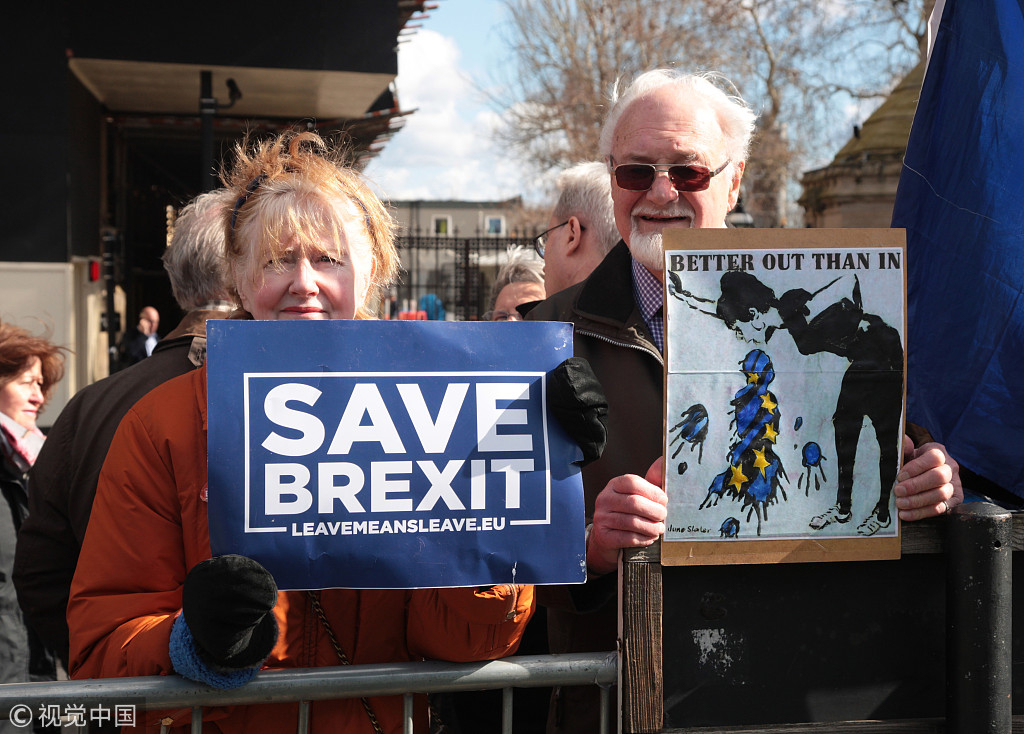
Opinion
12:10, 18-Mar-2019
Fun, frolics, and framing at the Brexit Pantomime!
Richard Fairchild

Editor's note: Dr. Richard Fairchild is an associate professor in finance at the School of Management in the University of Bath. The article reflects the authors' opinions, and not necessarily those of CGTN.
On March 14, UK MPs voted overwhelmingly to ask the EU for a delay to the Brexit process. It means that the UK may not leave the EU on March 29 as planned. As the 'pantomime' of the Brexit vote rolls on, it is worth taking a step back to examine the politics and psychology at play here.
In a whirlwind week, the MPs voted to reject Prime Minister Theresa May's deal last Tuesday, and then rejected a "no-deal" Brexit a day later.
It is no surprise that the first vote on Tuesday went against May. The House had rejected her deal twice before, and she kept coming back with the same agreement. The rejecting voters are a combination of those who think that we could genuinely get a better deal in negotiations with the EU, and those playing games for personal reasons.
The interesting vote was the rejection of a "no-deal" Brexit on March 13. Psychologists talk about "framing": the way a problem is framed can greatly affect the way people react.
Asking MPs to vote on whether to reject a no-deal appears to be a double negative, which was passed with that very narrow majority of four. How would the vote have gone if the question to the MPs had been framed as the possibly equivalent, "Should we only leave if we have a deal?" And then the question becomes, "Which deal?" given that May's deal has been repeatedly rejected.

UK Prime Minister Theresa May speaks during the weekly Prime Minister's Questions (PMQs) in the House of Commons in London, March 13, 2019. /VCG Photo
UK Prime Minister Theresa May speaks during the weekly Prime Minister's Questions (PMQs) in the House of Commons in London, March 13, 2019. /VCG Photo
On the Spectator website, BBC correspondent Robert Peston informs us that, when May asks for a delay, the EU will ask her if she has a plan for securing a deal during the delay. If she does not, then the delay will be rejected by the EU.
Interestingly, on the same night (last Thursday) that MPs voted to ask for a delay, a group of MPs, led by Benn, Letwin and Cooper, put forward a motion that the House should take control of Brexit from May.
This was rejected. Peston states that this just strengthened the possibility of the UK leaving without a deal on March 29, as the EU will most likely reject May's request for a delay, since she has no credible alternative, and the House has voted not to take control of the process. The continuing bargaining and voting games strengthen the likelihood of a no-deal Brexit on March 29!
An ongoing debate has been whether leaving without a deal is bad for Britain anyway. In economic bargaining game-theory, players should always leave the possibility of no-deal on the table: the ability to walk away from negotiations to take one's "outside option" gives a player a stronger position at the negotiating table. Game theory shows that ruling out "no deal" weakens a player's bargaining position, particularly as the bargaining deadline approaches.
Some argue that a second public referendum on Brexit is undemocratic. The public has already voted, at the first referendum, in 2016, for Brexit (although, of course, that was quite narrow with 52 percent for Leave and 48 percent for Remain). Others argue that democracy has already been hijacked, with the political games and machinations that have been going on in recent months.
The author Lionel Shriver argues that the simple framing of the question at the original election masked the complexities to come!

Protesters demonstrate outside the Houses of Parliament in London, March 14, 2019. /VCG Photo
Protesters demonstrate outside the Houses of Parliament in London, March 14, 2019. /VCG Photo
In the tautological words of May, "Brexit means Brexit!"
As Shriver stated on the BBC program "Newsnight" (broadcast March 13), nobody had even heard of a hard Brexit and soft Brexit at the time of the referendum, and that Brexit can mean whatever you want it to mean. The British public was simply voting to leave. On the same panel, former political aide Alistair Campbell argues that a second referendum is actually the democratic way to go.
Many voters complain of misinformation, lies and confusion at the time of the original referendum. With the benefit of hindsight, voters now have more information about what Brexit possibly looks like, and can make a more informed voting decision. Perhaps the only democratic way is to have a second referendum, which will involve the same British public voting as in the first vote. If we go down this route, then the framing of the question needs to be carefully thought about to make the vote as fair and transparent as possible.
There is a historical precedent on the effects of framing in voting here.
In 1973, the Conservative Government, under Prime Minister Ted Heath, took Britain into the European Economic Community, the forerunner of the EU, without consulting the British public. Then in 1975, the newly-elected Labour Government, led by Prime Minister Harold Wilson, renegotiated the terms of British membership in the EEC. Then, the public was allowed a vote, where the question was framed: "Should we stay in the EEC?" Many people said that, if they had had the vote in 1973 whether to go in, they would have voted no, "but now we are in, we might as well vote to stay in".
One thing is for sure, the perpetual game-playing, and endless permutations, strategies, and outcomes provide much excitement and fun for behavioral game-theorists, who even now are drawing up their complex game-trees and trying to assess the future equilibrium path of the Brexit game!
(If you want to contribute and have specific expertise, please contact us at opinions@cgtn.com.)

SITEMAP
Copyright © 2018 CGTN. Beijing ICP prepared NO.16065310-3
Copyright © 2018 CGTN. Beijing ICP prepared NO.16065310-3